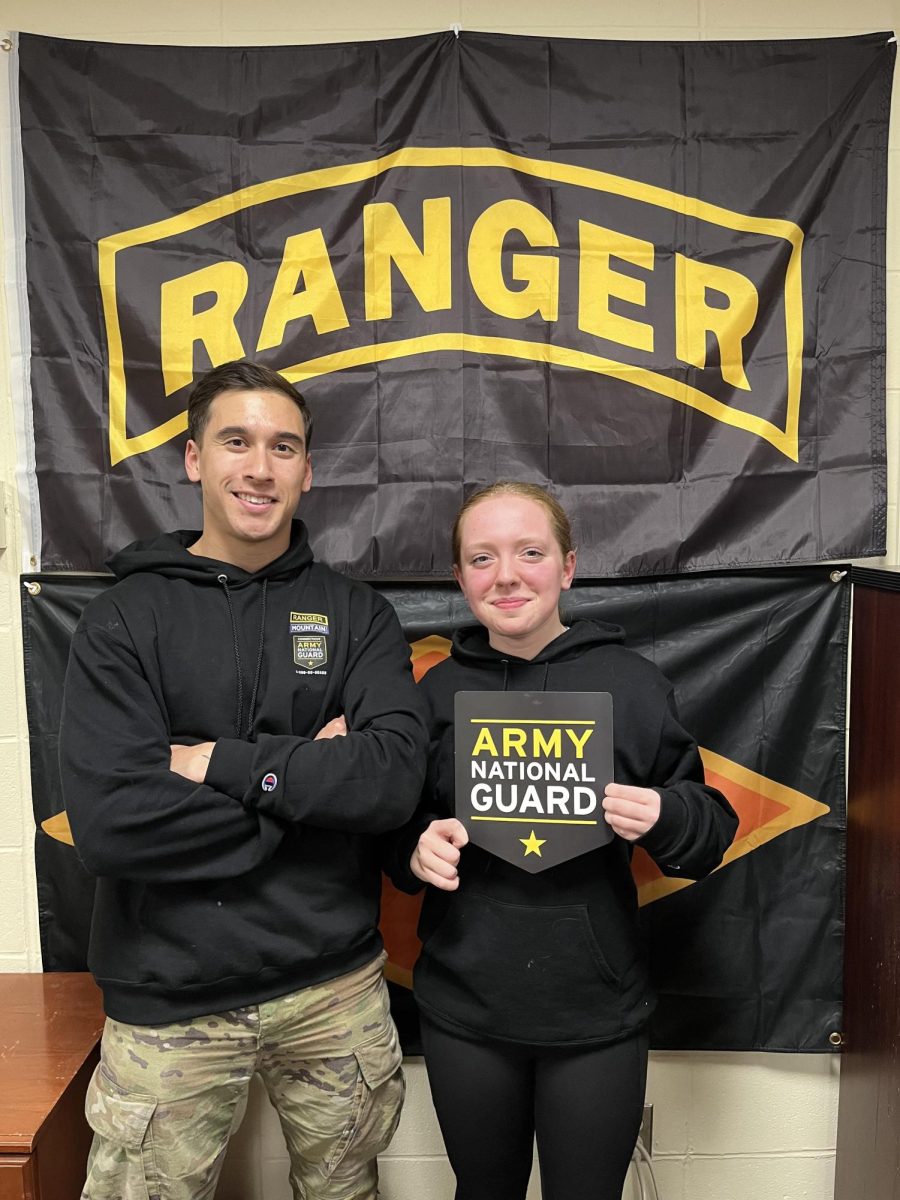Less than 1% of Americans sign for the military.
There’s a lot of behind the scenes work that goes into signing. Recruits have to provide paperwork; get fingerprinted , attend meetings with recruiters, take the ASVAB (Armed Services Vocational Aptitude Battery) and go to MEPS (Military Occupational Specialty). The paperwork has a lot of health and family related questions.
Emerson Bunnell is a WHS senior who is signing for the Air Force: “I did a ton of paperwork. It was only slightly difficult because it involved a lot of talking to people and gathering everyone’s phone numbers.” The phone numbers are used to contact people for references or in case of an emergency.
Some people take the ASVAB before talking to a recruiter to see what MOS they qualify for.
SSG (Staff Sergeant) Ruckey, who has been a part of Army National Guard for seven years and has been recruiting for two: “Take the ASVAB, see what branches have which jobs for your score. And talk to all recruiters before making a decision.”
Each branch of the military has a different score you need to get on the ASVAB to be able to join and will dictate what MOS you can get.
The Air Force, Air National Guard, Navy and Army require a minimum score of 31 on the ASVAB.
If a recruit has a low ASVAB score, the jobs are limited. The higher the score, the more jobs one will get to choose from. People with a score between a 21 and a 30 are given the choice to do a program called Future Soldier Preparatory Course, a 90 day course to improve your score.
Other branches have more flexibility with the jobs available for recruits with low ASVAB scores.
Once you finish the ASVAB, recruits move onto MEPS (Military Entrance Processing Stations). MEPS is the place where you go in order to start your contract, swear in and everything in between.
This will involve a full day of medical exams, questioning, and more fingerprints. You get to a hotel in Massachusetts the night before, go through a briefing at 2030 (8:30), and the rest of the night is yours. You have to be in your room by 2200 (10:00) as wake-up is at 0420 (4:20). Breakfast is from 0450 to 0520 (4:50-5:20) and you leave for MEPS at 0530 (5:30).
Bunells said, “MEPS was really nerve wracking but you can’t be nervous or anxious or you can just don’t say it out loud cause they’ll penalize you for it, but as long as you show them a ton of respect and compliance they were actually kinda nice.”
If signing for active duty, meaning working for the military full-time, depending on if the person took the ASVAB, they will be there four times, if not, they will be there three times. If they are signing for the National Guard, they will be at MEPS two to three different times.
Before you go to MEPS, make sure all your medical information is up to date. The first day at MEPS is all about medical information, making sure you are physically ready for the military. This will involve a hearing test, eye test, drug tests, questioning and a physical exam.
The next time you are at MEPS, it’s signing day. This day will involve signing your contract, making sure all your paperwork is correct, choosing how many years you want to serve in the military and your swearing in. This day isn’t as stressful as the first day. Once it’s time to swear in, you go into a room and the workers at MEPS talk through everything, after that the briefing is done, you go into a room where you stand in parade rest (hands behind your back, legs shoulder width apart and toes faced forward). You will stand in parade rest to show respect to ranks higher than you.
Once you’re sworn in, you go back to your branch liaison and go through your contract. A liaison is someone who helps guide you through your day at MEPS. This is the final check to make sure that all of your information is correct, that you have the amount of years you want and go through all documentations. Once your signature is on the paper, you are officially in the military.
I signed for the Army National Guard and once I swore in I was happy, nervous and excited. Knowing that I am leaving for basic training this summer and will be gone until the end of the year is a good feeling.
I am currently attending ARISE at least once or twice a month. This program is held at the New London Army National Guard building, with SSG Ruckey. ARISE is a program open to everyone, providing the chance to push yourself physically.
I also attend RSP (Recruit Sustainment Program) once a month on a weekend at Camp Nett.
RSP prepares recruits for basic training both mentally and physically. The majority of the day is spent outside or in the gym but some time is also spent in a classroom learning the army values and rules. You will also have fire guard duty, where you walk around the barracks for an hour, making sure everyone is accounted for, checking that nobody is getting sick, and assuring everyone’s safety.
At the end of the day, the drill sergeants are there to make you a stronger recruit and know what to expect at basic training. The first time I attended RSP, it was stressful. Going in, not knowing anything was stressful because others knew what the drill sergeants were saying. At the end of the weekend I did feel more confident with myself and understood what the drill sergeants were saying.
If you are interested in signing for the military, reach out to a recruiter. Ask them questions so that you can get the best fit for yourself. The hardest part about signing is making sure this is the right decision and that you are 100% sure you want to do this.



